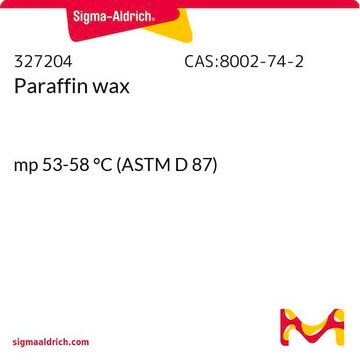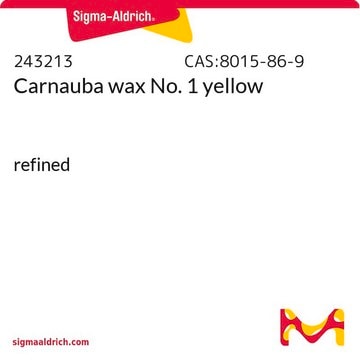Recommended Products
form
beads or pellets
flakes or chunk(s)
mp
≥65 °C (ASTM D 87)
InChI key
JWHAUXFOSRPERK-UHFFFAOYSA-N
Looking for similar products? Visit Product Comparison Guide
Related Categories
General description
Paraffin Wax is a low cost petroleum product that contains hydrocarbons with 20-40 carbon atoms. It is mainly used in lubricants, candles and electrical insulations.
Application
Paraffin wax can be used as a phase changing material in a wide range of applications which include solar based water heaters, microcapsules and thermal energy devices (TEDs).
Storage Class Code
13 - Non Combustible Solids
WGK
nwg
Flash Point(F)
602.6 °F - Pensky-Martens closed cup
Flash Point(C)
317 °C - Pensky-Martens closed cup
Personal Protective Equipment
dust mask type N95 (US), Eyeshields, Gloves
Certificates of Analysis (COA)
Search for Certificates of Analysis (COA) by entering the products Lot/Batch Number. Lot and Batch Numbers can be found on a product’s label following the words ‘Lot’ or ‘Batch’.
Already Own This Product?
Find documentation for the products that you have recently purchased in the Document Library.
Customers Also Viewed
Compounding of ethylene-propylene polymers for electrical applications.
Brown M.
IEEE Electrical Insulation Magazine, 10(1), 16-22 (1994)
Paraffin Products, 14(,
pages=) (1983)
Performance investigation of thermal energy storage system with Phase Change Material (PCM) for solar water heating application.
Mahfuz MH, et al.
International Communications in Heat and Mass Transfer, 57(3), 132-139 (2014)
Development of thermo-regulating textiles using paraffin wax microcapsules.
Sanchez P, et al.
Thermochimica Acta, 498(1-2), 16-21 (2010)
The lubrication mechanism of calcium stearate/paraffin wax systems in PVC compounds.
Rabinovitch EB, et al.
Journal of Vinyl Technology, 6(3), 98-103 (1984)
Our team of scientists has experience in all areas of research including Life Science, Material Science, Chemical Synthesis, Chromatography, Analytical and many others.
Contact Technical Service









